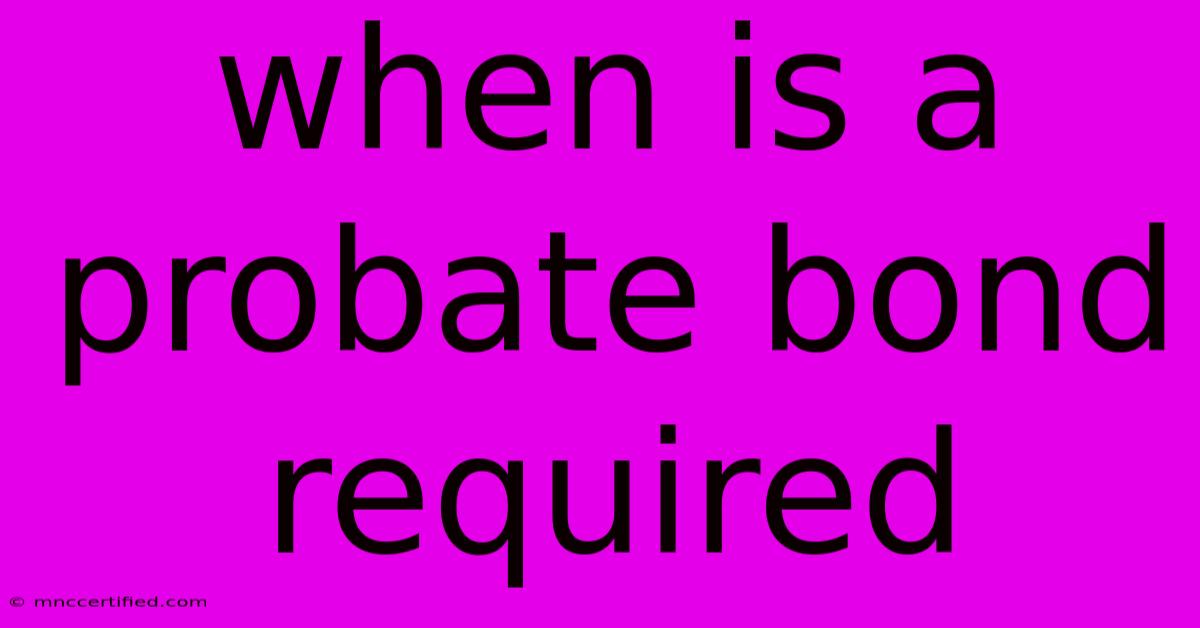When Is A Probate Bond Required

Table of Contents
When is a Probate Bond Required? Navigating the Complexities of Estate Administration
Navigating the probate process can be complex, and understanding when a probate bond is required is crucial for executors and administrators. This article will clarify the circumstances surrounding probate bonds, helping you understand your responsibilities and protect the interests of the deceased's beneficiaries.
What is a Probate Bond?
A probate bond is a type of surety bond required in some probate cases. It essentially acts as insurance, protecting the beneficiaries of a will or the heirs of an intestate estate (one without a will) from potential mismanagement or misuse of estate assets by the executor or administrator. The bond guarantees that the personal representative (executor or administrator) will faithfully administer the estate according to the law and distribute the assets accordingly. If the personal representative mismanages the estate, the beneficiaries can make a claim against the bond.
When is a Probate Bond Typically Required?
The necessity of a probate bond varies significantly by state. There's no single federal requirement. However, several common situations trigger a probate bond requirement:
1. Executor or Administrator Isn't a Close Relative:
Many states mandate a probate bond when the executor or administrator isn't a close relative of the deceased, such as a spouse, child, or parent. This is because there's a perceived higher risk of mismanagement when the appointed individual lacks a direct familial relationship. This is a common trigger and crucial to understand.
2. Large or Complex Estate:
If the estate includes significant assets, including substantial real estate holdings, valuable personal property, or complex financial instruments, a probate bond may be required. The higher the value of the estate, the greater the potential for financial loss, justifying the added protection of a bond. High-value estates are frequently subject to stricter requirements.
3. Suspicion of Mismanagement or Fraud:
Even if the executor or administrator is a close relative, a court may require a bond if there is reason to suspect potential mismanagement, dishonesty, or fraud. This could arise from prior legal issues or concerns raised by beneficiaries. This highlights the court's role in protecting the estate's integrity.
4. Court Order:
Ultimately, a probate court judge has the authority to order a probate bond regardless of other factors. If the judge feels that a bond is necessary to protect the interests of the beneficiaries, they will mandate it. This underscores the judge's ultimate responsibility in overseeing the estate administration process.
5. Specific State Laws:
Each state has its own unique laws regarding probate bonds. Some states may have more stringent requirements than others, while some might have specific exceptions. Therefore, it's essential to consult with a probate attorney in your specific jurisdiction to determine the exact requirements.
Understanding the Bond Amount
The amount of the probate bond is usually determined by the value of the estate. It’s a percentage of the total asset value, often ranging from the full value to a much smaller percentage, depending on the circumstances and state laws. This ensures adequate coverage for potential losses.
Avoiding Probate Bond Requirements
While not always possible, there are ways to potentially minimize the need for a probate bond:
- Proper Will Preparation: A well-drafted will that clearly outlines the distribution of assets can reduce the court's concerns and may lessen the likelihood of requiring a bond.
- Choosing a Trustworthy Executor: Selecting a responsible and trustworthy executor, ideally a close relative with strong financial management skills, can help avoid suspicion.
- Transparent Estate Administration: Maintaining meticulous records and providing regular updates to beneficiaries fosters trust and can help avoid unnecessary court intervention.
Conclusion: Seek Professional Guidance
Navigating probate can be daunting, particularly understanding the nuances of probate bonds. The information provided here is for informational purposes only and should not be considered legal advice. It's crucial to consult with a qualified probate attorney to determine the specific requirements and obligations related to probate bonds in your jurisdiction. They can provide personalized advice tailored to your unique situation and ensure you comply with all applicable laws. Proper planning and professional guidance can significantly simplify the process and protect the interests of all parties involved.

Thank you for visiting our website wich cover about When Is A Probate Bond Required. We hope the information provided has been useful to you. Feel free to contact us if you have any questions or need further assistance. See you next time and dont miss to bookmark.
Featured Posts
-
Is Gas Station A Good Investment
Nov 22, 2024
-
Insurance Agent Defense Attorney
Nov 22, 2024
-
Browns Win Last Minute Field Goal
Nov 22, 2024
-
Russias First Icbm Use In Ukraine War
Nov 22, 2024
-
Milhouses Funniest Moments Hayden
Nov 22, 2024